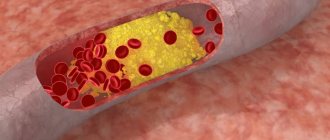Is multiple sclerosis inherited? Prerequisites for the development of this pathology exist. Multiple sclerosis is a multifactorial, hereditarily determined autoimmune disease that develops under the influence of external and internal factors. The risk of developing the disease in a child, one of whose parents suffers from multiple sclerosis, does not exceed 3%. This is a fairly low figure.
The following causes of multiple sclerosis are known today:
- the disease is more common in people living on all continents north of the 30th parallel;
- a huge role in the occurrence of multiple sclerosis is played by autoimmune mechanisms, which are activated under the influence of T-lymphocytes, as a result of which lipids and proteins of the myelin sheath are damaged;
- It is assumed that the disease can develop due to a lack of vitamin D in the body and under the influence of viruses.
Multiple sclerosis is inherited. The children of a person with multiple sclerosis are less likely to develop the disease than their siblings. Hereditary predisposition depends on many independent genes. Genes located on the seventh chromosome, as well as genes of immunoglobulin heavy chains, are involved in the development of multiple sclerosis. Patients with multiple sclerosis lack protective loci identified in healthy people.
Regardless of the cause of the disease, the myelin sheath is destroyed and pathological lesions form in the brain and spinal cord. Achieving good treatment results requires extensive experience of doctors and well-equipped clinics. The Yusupov Hospital has all the conditions for the treatment of multiple sclerosis. Professors and doctors of the highest category of the neurology clinic have specialized in leading multiple sclerosis centers in Europe and North America. Treatment is carried out with modern drugs that are highly effective and have a minimal range of side effects. Treatment regimens and drug doses are selected individually, depending on the form and course of the disease.
Gender and age
Multiple sclerosis can be diagnosed at almost any age. However, in most cases the disease begins to develop between the ages of 20 and 40. Most often, multiple sclerosis occurs in women of childbearing age (the disease rarely begins before puberty or during menopause). In men, the first symptoms appear between the ages of 15 and 40, and the disease, as a rule, has a more severe form and is less responsive to treatment. About a quarter of patients are men. Most likely, this dependence is influenced by the characteristics of the hormonal system in men and women.
Viral infections
The influence of infectious agents is one of the fundamental factors in the development of MS, but until now the exact mechanism of influence has not been studied.
There is no evidence to suggest that MS is a direct consequence of any specific disease. At the same time, there is evidence that some infectious agents can serve as a trigger in the development of multiple sclerosis: retroviruses, measles, herpes, rubella, mumps, Epstein-Barr viruses. There is also evidence of the possible influence of staphylococcal infection [6, 7].
Prevalence rate:
Gene factor for disease development
MS itself is not a hereditary disease , however, due to many years of research, a clear correlation was found that relatives are actually much more likely to develop this disease than those who did not have it in their family.
This is confirmed by the figures - 2% among the “hereditarily healthy” and up to 10% among people with sick relatives.
Is there a special gene for MS?
It has not yet been possible to identify a specific gene that affects the occurrence of MS , but some differences are visible in the combination of mutation frequencies of HLA class I and class II genes depending on the nationality and race of patients.
For example, in the USA, an increased connection between the appearance of multiple sclerosis and the presence of antigens B7, DR2 in patients was noticed, in Central Russia - with the A3 and B7 loci, in Siberia - A1, A9, B7.
In peoples living in Europe with this disease, the haplotype DR2 (DW2) DRB1*1501 - DQA1*0102 - DQB1*0602 of the HLA class II system is most often determined.
Factors that can lead to mutations in genes include:
- A mutation in T-lymphocytes, when some of them cease to perform a protective function and begin to destroy the immune system.
- Bad habits - alcohol, smoking, drugs.
- Frequent viral, infectious and fungal diseases.
- Constant stress.
Genetic MS can occur in the following scenarios:
- Relapsing-remitting multiple sclerosis. It is characterized by rare periods of exacerbations, with the possibility of full recovery with proper treatment.
- Secondary progressive sclerosis. With this form, the symptoms worsen constantly, but with fairly long periods of remission.
- Primary progressive sclerosis. Rare periods of remission. The patient's condition is permanently deteriorating.
- Sclerosis that progresses with exacerbations is a constant deterioration of the condition, there are practically no periods of remission.
Genetic predisposition as a cause of the development of multiple sclerosis:
Find out more about multiple sclerosis:
- causes and consequences of the disease;
- the first signs and symptoms of the disease;
- methods of diagnosing the disease, including MRI diagnostics;
- forms and variants of the course of pathology;
- diseases similar to MS;
- pregnancy and childbirth in the presence of this disease.
Psycho-emotional stress and stress
Researchers do not dispute the influence of traumatic situations on the onset of the disease. According to statistics, patients with multiple sclerosis have high rates of anxiety and stress [12].
The psycho-emotional state can affect the physiological parameters of the body. When a person experiences severe stress or is depressed for long enough, the body's immune defenses decrease. Chronic stress, like acute psychological trauma, contributes to the production of a whole complex of neuropeptides - special substances that can significantly disrupt biochemical processes in the body, as well as suppress the activity of cells of the immune system and lead to a state of immunodeficiency. In turn, lymphocytes (immune cells), as the main link in the development of multiple sclerosis, manifest their activity against the background of reduced immunity, stimulating the development of the demyelinating process [12].
Modern views on the treatment of multiple sclerosis
Doctors at the Yusupov Hospital take an individual approach to treating each patient. Exacerbations are relieved, the appearance of new symptoms and the increase in neurological deficit are prevented, and symptomatic medications are selected. Neurological disorders are restored using pulse therapy with methylprednisolone, which is administered intravenously. To relieve severe exacerbations, accompanied by an increase in neurological deficit with impairment of vital functions, plasmapheresis is performed, combining it with intravenous administration of prednisolone.
Neurologists at the Yusupov Hospital prescribe therapy that modulates the course of multiple sclerosis as early as possible. It allows you to stabilize the patient's condition. In relapsing-remitting multiple sclerosis, it prevents transformation into a progressive course, and also reduces the frequency of exacerbations and slows down the increase in disability.
You can undergo diagnosis and treatment of multiple sclerosis at the Yusupov Hospital. Make an appointment by phone with a neurologist experienced in treating demyelinating diseases. Doctors use modern diagnostic methods and use individual regimens of the latest drugs for treatment.
Where do you live?
People living further from the equator are more susceptible to multiple sclerosis.
The culprit is probably vitamin D. Or rather, a lack of it. The body produces vitamin D in response to sunlight. People living in northern latitudes lack sunlight, especially during the winter months. Vitamin D deficiency is associated with many diseases, including multiple sclerosis. However, multiple sclerosis also occurs in southern countries, albeit less frequently. This may be influenced by migration factors.
SYMPTOMS AND SIGNS OF MULTIPLE SCLEROSIS
Manifestations of the disease depend on which nerves are damaged and how severely. The first signs of multiple sclerosis may include disturbances in sensitivity, speech, and vision.
In the future, people complain of muscle weakness, poor balance and coordination of movements, painful muscle tension (spasticity), trembling (tremor). Some patients experience temporary or permanent paralysis. Disorders of the functions of the pelvic organs are often observed.
Many people with multiple sclerosis experience chronic fatigue. The disease can cause forgetfulness, difficulty concentrating, as well as mood swings and depression. Symptoms of multiple sclerosis can occur in any combination. They can be expressed weakly, moderately or strongly.
State autonomous healthcare institution
State Autonomous Healthcare Institution "Republican Clinical Neurological Center"(GAUZ "RKSC") is a medical institution that provides specialized medical care at the modern methodological level to patients with socio-economically significant diseases of the nervous system.The main directions of diagnostic and treatment activities of the State Autonomous Institution "RKSC":
1. Diagnosis and treatment of demyelinating diseases of the nervous system: multiple sclerosis and other leukoencephalopathies, chronic inflammatory demyelinating polyradiculoneuropathy (CIDP), etc.
2. Diagnosis and treatment of diseases of the peripheral nervous system (radiculopathy, plexopathy, mononeuropathy) of various etiologies.
3. Restorative and rehabilitation treatment of patients with the consequences of a stroke, traumatic brain injury and spinal injury.
4. Diagnosis and treatment of degenerative diseases of the central and peripheral nervous system.
The Republican Clinical Diagnostic Center for Demyelinating Diseases (RCDC DZ, Ministry of Health of the Republic of Tajikistan) operates as part of the State Autonomous Institution "RKSC" and maintains the Republican Register of Patients with Multiple Sclerosis. In the Republican CDC of the Department of Health of the Ministry of Health of the Republic of Tajikistan, dispensary observation is carried out for patients with multiple sclerosis receiving immunomodulatory therapy for DMTs.
The consultative and diagnostic clinic of the State Autonomous Institution "RKSC" is designed for 95 visits per shift and provides outpatient care to patients with various neurological pathologies. The diagnostic and treatment unit includes an X-ray service, a modern neurophysiological laboratory, a clinical and biochemical laboratory.
All necessary studies are carried out in the neurophysiological laboratory: stimulation and needle electromyography, evoked potentials of all modalities, transcranial magnetic stimulation, registration of the blink reflex and long-latency reflexes, electroencephalography and an innovative study of blood serum and cerebrospinal fluid proteins (for the presence of mono- and oligoclonal immunoglobulins of class G and M ) using gel electrophoresis and isoelectric focusing.
On the basis of the State Autonomous Institution "RKSC" the Department of Neurology and Manual Therapy of the State Budgetary Educational Institution of Further Professional Education of the KSMA of the Ministry of Health of Russia carries out scientific and educational activities, where doctors are trained in the specialties of "nervous diseases" and "manual therapy".
GAUZ "RKSC" carries out medical activities on the basis of License No. LO-16-01-004452 dated September 25, 2015, issued by the Ministry of Health of the Republic of Tatarstan.
Statistics on possible transmission of the disease to children
Since the discovery of this disease, many studies have been conducted on the transmission of this disease to children. However, the most complete picture was presented by a group of Swedish scientists, consisting of doctors and analysts.
The studies included data from all national disease registries and involved more than 28,000 people. As a result, it was revealed that the probability of transmitting MS by inheritance was less than one percent (initially it was believed that it was 3%).
Additional research has also been conducted to determine whether the gender of the parent affects the transmission of genes (initially it is believed that genetic diseases are transmitted mainly through the maternal line) and whether the likelihood of MS in twins increases.
The data from these studies showed surprising numbers. The risk of transmitting the disease from father to child was slightly higher (by several percent) than from mother .
This phenomenon is called the “Carter Effect” and shows that the likelihood of “inheriting” a disease from a parent of a less affected gender is higher.
The study on twins, which took the most time and effort, showed that the average probability of transmission of the disease from parents to twins was less than a percent, and if you take into account the birth of children, for example, one mother who has MS and several men, then the probability drops to 0 .01%.
Multiple sclerosis is a serious but not fatal disease that has a clear genetic form . However, with proper treatment and care, a person suffering from this disease can live a long and happy life, leaving behind absolutely healthy offspring.









